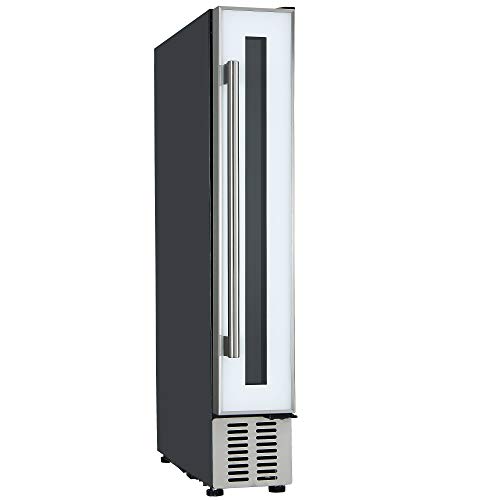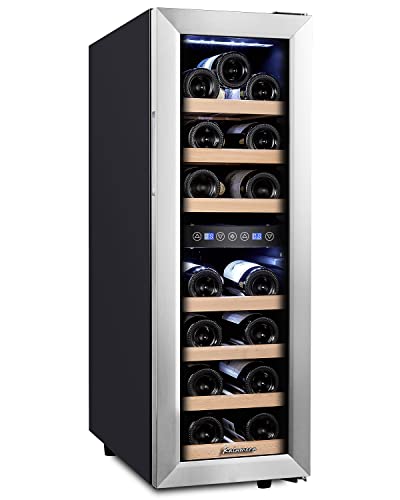Five Killer Quora Answers On Beer And Wine Refrigerator
페이지 정보
작성자 Raymond 댓글 0건 조회 6회 작성일 24-09-19 18:27본문
 Choosing a Beverage and Wine Refrigerator
Choosing a Beverage and Wine Refrigerator This dual-zone refrigerator is ideal for storing and cooling both beer and wine. It can be built-in or freestanding and has a sleek seamless door that looks amazing in any space.
This dual-zone refrigerator is ideal for storing and cooling both beer and wine. It can be built-in or freestanding and has a sleek seamless door that looks amazing in any space.Although vibration is generally harmless however, it can cause disturbance to the sediment in a bottle and trigger complex chemical reactions that aren't evident. This can alter the taste and decrease esters over time.
Control of Humidity
Humidity refers to the amount of water vapor present in the air, and it changes throughout the day based on a variety of factors. Temperature as well as precipitation, wind, and other environmental conditions can dramatically influence the humidity levels. Maintaining a healthy level of humidity is crucial for a variety of reasons. Humidity can affect weather patterns, indoor air and even wine storage. Many aromatic compounds in wine are sensitive to variations in humidity. A wine's taste can be affected by excessive humidity. It can alter the balance of these aromatic compounds. A wine refrigerator can help maintain the proper humidity level to preserve the wine's flavor.
A wine cooler and fridge fridge can also help prevent cork deterioration, and ensure that the seal is intact. If humidity is too low, corks can dry out and allow oxygen into the bottle, accelerating the aging process and tainting the wine's flavor. A wine fridge can help keep an average humidity of 55% to 75 percent to prevent this from happening.
Wine coolers are also a great way to store wine and beer. A wine cellar is made for long-term storage. A lot of these units contain a space specifically for beer bottles, which means you can easily store your favorite craft beers and lagers in the same spot as your favorite wines. These units are designed to regulate temperature and humidity in order to prevent condensation, which can cause damage to labels and packaging.
Most models have the hygrometer, which lets you monitor and adjust humidity levels in your wine cooler. You can also utilize a humidifier to boost the humidity of your wine fridge.
If you decide to use a dehumidifier, make sure it is set up in a separate room from the wine fridge. This will ensure that the dehumidifier will not absorb any of the wines or beers you're storing in the fridge. If you plan to keep your wine for a prolonged duration, controlling humidity is crucial. In a short period of time, you may not notice any changes in your wine. However, over the course of months or years, a lack of humidity can drastically alter the flavor profile of your wine.
Vibration Absorption
The vibrations in the wine fridge may affect the natural aging process of stored wines. Even small vibrations can trigger disturbance in the sediment inside the bottle, which triggers intricate chemical processes that can reduce esters and dull the wine's taste over time. To protect your valuable wine collection, all La Sommeliere units are equipped with a specific vibration absorption system that significantly lessens the impact of tremors as well as noise, and helps ensure that your wines age properly and quietly.
Despite the fact that wine refrigerators produce less noise than normal fridges, the fan and refrigerant circuits that are used in a variety of units are still prone to creating noise. For this reason, it is essential to adhere to the guidelines for clearance when installing your wine cooler and put the unit in a quiet area away from other sources of disturbance.
It is also recommended to clean your wine cooler periodically with a nonabrasive cleaner. let it "air out" for a few minutes before loading it with bottles. This will minimize the amount of dust and dirt that can accumulate in the air vents.
Finally, if you notice that your wine rack fridge fridge is producing excessive noise, it could be because of an electric fan that isn't working or the compressor. The compressor is typically located behind the counter wine fridge refrigerator. If it is not placed properly or bumps into something behind it the rubber mounts could be shaken loose, which can cause loud humming noises.
The compressor wine cooler works like a standard fridge by compressing air molecules electronically, which lowers their temperature. Then, they are blown throughout the interior of your refrigerator. This type of cooling is much more energy-efficient than other cooling methods such as evaporator or frost-free refrigerators. The downside to compressor compact wine fridge coolers is that they require more frequent repairs and tend to produce more noise than other kinds of refrigerators. Many consumers opt for thermoelectric wine chillers that do not require a compressor.
Temperature Control
Wine, as well as beer, has specific temperature requirements to ensure its flavor is maintained. This makes it essential to select a wine and beverage fridge with temperature controls that can be adjusted to allow you to store your drinks at the perfect temperature for serving and storage for each style. You can also find dual zone models that have a separate temperature zone for wine bottles as well as a separate temperature zone for other beverages, such as beer.
In general, the majority of beer styles prefer to be served cooler than wine. The ideal temperature for serving a particular style will depend on the kind and the method used to make it. Wheat beers and Pilsners should be served between 40 and 50 degrees Fahrenheit, while the IPAs, barleywines, and stronger ales are best rated wine fridge served at 50 to 55 degrees Fahrenheit. The beer that is left to warm too much will give it an unpleasant "skunk" aroma that detracts from the overall enjoyment.
You'll need a wine refrigerator with an appropriate temperature range for your preferred whites and reds. Some wine refrigerators come with humidity-control features that help prevent the cork from becoming oxidized and keep it in good shape. Some wine refrigerators even have specialized UV-blocking glass to prevent sunlight from affecting the wine and making it age prematurely.
The temperature control system of a refrigerator can be powered by compressor technology or thermoelectric cooling. Compressors use the vapor compressor to lower temperatures in the wine refrigerator, whereas thermoelectric models use electronic convection fans to circulate cool air throughout the refrigerator. The majority of refrigerators utilize a combination of these technologies for the most effective results.
If you're looking to purchase a wine and beverage fridge that utilizes compressor technology, you should consider buying one with shock pads that absorb vibration. This is because the vibration generated by compressors can alter the normal maturing process of wine and speed up oxidation.
While you can purchase a fridge that's designed specifically for wine, you might prefer to purchase a standard refrigerator, or even a standard refrigerator that has a large interior that has movable shelves and ample storage on the doors. You can then modify the space to fit an array of wine, beer, and other bottles and cans.
Storage Options
Consider a beverage cooler if you like to host events. These refrigerators can store bottles and cans of beer, wine and other drinks that are ice-cold like water and soda. They're available in freestanding and built-in versions. A built-in model can be integrated under counters or into cabinetry in kitchens with limited space.
Both types of fridges are available in a broad variety of sizes and designs, making them suitable for most homes. Make sure you choose models with sliding shelves, which makes it easier to find your most loved beverages and wines. Some refrigerators have soft LED lighting that can show off your collection with a soft, gentle glow. Some refrigerators even come with a humidity control feature. This function can help prevent the development of frost in your wine or beer bottles, so that you can enjoy your favourites without worrying about the build-up of frost.
Dual-zone refrigerators can keep your most loved wines at the ideal temperature to serve. You can also store craft beers in separate zones as it has similar ideal temperatures to the wine bottle. A dual zone beer and wine refrigerator can also hold larger bottles of beer or spirits than a standard fridge.
Keep your wine and beer in an area that offers light protection. The proper conditions will extend their lifespan. Keep the refrigerator free of dust and odors that can affect the flavor of your drinks.
If you're storing a large collection of wines and want to preserve their quality, think about a cellar refrigerator. This type of fridge is specifically designed for long-term storage. It operates at a slightly warmer temperature than a wine refrigerator, allowing your bottles to maintain their optimal flavor. A cellar fridge also comes with humidifiers that keep the right humidity level. This ensures that the cork stays dry and impermeable. It also keeps external air and food items from your refrigerator from getting into the bottle and deteriorating it over time.
댓글목록
등록된 댓글이 없습니다.